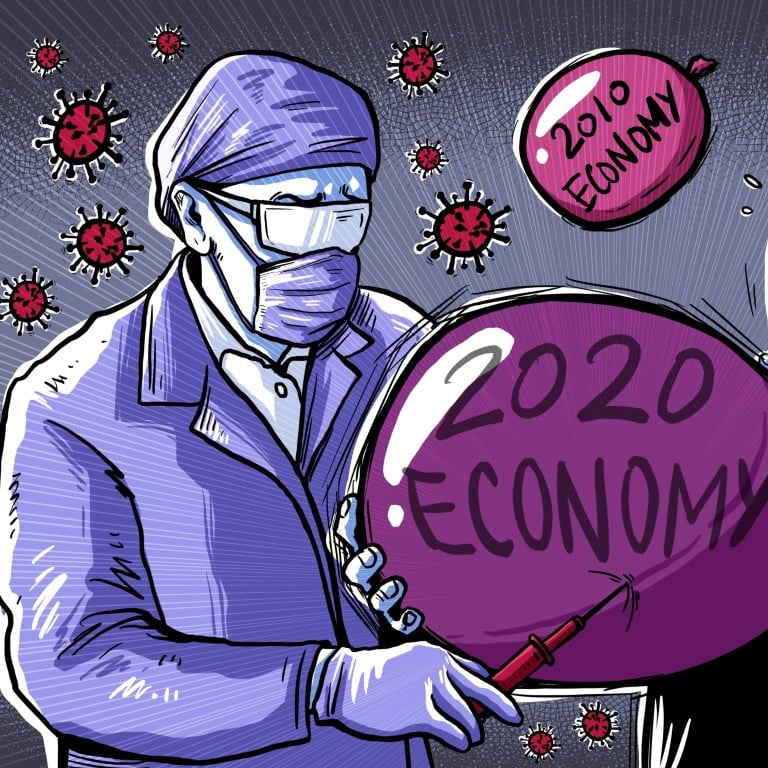
Coronavirus: China’s small firms at risk while outbreak poses challenge to Beijing’s grand economic goals
- As coronavirus dents Lunar New Year sales season, small firms in China worry about 2020 businesses outlook
- Most small firms, a cornerstone of economic activity and jobs, do not have reserves to weather a major economic storm
Even 200km away from the epicentre of the deadly coronavirus outbreak, Chinese crab farmer Peng Guobing is feeling anxious about his business.
But like scores of other small business owners in China, the disease outbreak has turned his plans upside down.
The virus, which has claimed the lives of more than 1,000 people and infected more than 40,000 in mainland China, shows little sign of being brought under control.
China had 63 million “self-employed businesses” at the end of 2018, providing 150 million jobs, according to the latest economic census by China’s National Bureau of Statistics.
Peng said he was expecting heavy losses this season, as about two thirds of his crabs – or 10,000kg that sell for about 60 yuan (US$8) a kilogram – are stuck in his ponds.
Making matters worse, he has been unable to receive baby crabs for next season after authorities imposed transport restrictions to curb the spread of the virus. If his ponds are not cleaned and readied for the next batch by March, he may miss the upcoming season, too.
Crabs start mating in the spring season and they die quickly. It’s uncertain now whether the baby crabs can arrive in time
“Crabs start mating in the spring season and they die quickly,” said Peng from his home in Qipan. “It’s uncertain now whether the baby crabs can arrive in time.”
While China’s state-owned enterprises are blessed with access to cheap credit and key resources, small and private businesses remain the country’s most vulnerable, as they rely on a steady stream of customers to survive.
But the outbreak of coronavirus during the Lunar New Year holiday has already destroyed the largest sales season of the year for many, particularly retailers and restaurants.
Zhao Jian, head of the Atlantis Finance Research Institute, a think-tank, said accommodation, catering, retail and entertainment would suffer the most from the first shock wave, while small manufacturers and exporters would be next.
Xie Jun, a manager at a furniture and textile exporter based in Ningbo, Zhejiang province, said he was only permitted to resume production on Monday due to local government restrictions. But even then, the migrant workers who made up half of his workforce would not be able to return to work until they had completed a mandatory 14-day quarantine.
A recent survey conducted by researchers from Tsinghua and Peking universities in Beijing, two of China’s top institutions of higher learning, found that roughly two thirds of small and medium-sized enterprises had enough financial reserves to sustain operations for two months if revenues dried up.
The survey of 995 companies also found that 30 per cent expected revenues to shrink by at least half from 2019.
Louis Kuijs, the head of Asian research at Oxford Economics, said that China needs a growth rate of at least 5.6 per cent this year to double its economy. If China’s gross domestic product grows 5.6 per cent this year, the economy by year-end would be 99.8 per cent higher than it was in 2010.
In the meantime, the urgency to resume production, coupled with concerns about the spread of the virus, has put many local government authorities in a dilemma, with the Lunar New Year holiday over and hundreds of millions of migrant workers are set to return to work.
At a Politburo meeting last week, Xi said that containing the coronavirus was the priority for the government, but authorities should also keep a close eye on the economy.
Much of the outside world will be reinforced in its conviction that China is an untrustworthy actor, and that this untrustworthiness is baked into its opaque, authoritarian and over-controlled political system
Arthur Kroeber, head of research at consultancy Gavekal, said Beijing will pay for more than just economic loss after authorities in Wuhan were exposed of withholding information about the outbreak “until it was far too late to contain it”.
“Much of the outside world will be reinforced in its conviction that China is an untrustworthy actor, and that this untrustworthiness is baked into its opaque, authoritarian and over-controlled political system,” Krober wrote in a note. “This could impose several long-run costs”.
Back in Hubei, Peng said he hoped the virus could be controlled as quickly as possible and for his remaining crabs to be shipped to market.
“The demand for the delicacy is there,” Peng said. “Crabs are full of protein that can help the body. People eat a lot of crabs here, and that’s probably why the number of affected cases is very small in my town.”



